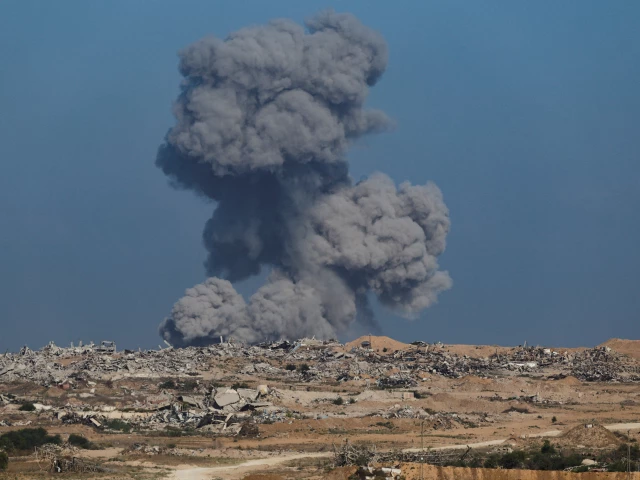ISLAMABAD
Pakistan welcomed US President Donald Trump’s 20-point peace plan, signalling a potential participation in an International Stabilization Force (ISF) that could be deployed to Gaza.
On Tuesday, Foreign Minister Ishaq Dar, who was part of the hectic diplomatic efforts with his other counterparts from Arab and Islamic countries, told a news conference here that Indonesia had offered to deploy 20,000 troops in Palestine.
“We hope Pakistan’s leadership will also take a decision in this regard,” Dar said, while responding to a question whether Pakistan would join the proposed ISF for deployment in the region.
The minister, however, clarified that the proposed force comprising troops from the Muslim countries would not be deployed inside Gaza but only assist the Palestinian law-enforcement agencies and the police. He added that the proposed plan would have the backing of the United Nations Security Council (UNSC).
President Trump’s 20-point peace plan, unveiled on Monday alongside Israeli Prime Minister Benjamin Netanyahu, raised many eyebrows and prompted questions about whether the initiative would lead to a two-state solution.
Dar, however, dismissed such criticism, insisting that there was no change in Pakistan’s principled stance on the issue of Palestine. He made it clear that Pakistan supports a two-state solution with pre-1967 borders and Al-Quds Al Sharif as the capital of future Palestinian state.
The plan, backed by eight Muslim states, including Pakistan, aims to enforce a ceasefire, protect civilians, and begin rebuilding war-torn areas. Dar confirmed that under the proposed agreement, an international peacekeeping contingent would be deployed to Palestine. He said Pakistan’s leadership would soon decide whether to contribute troops, noting that Indonesia has already offered to send 20,000 soldiers.
Dar stressed that Hamas was not expected to oppose the plan, saying, “We have been assured that Hamas will support this initiative.” He explained that the peace proposal followed a meeting between President Trump and the leaders of eight Muslim countries, where they discussed the urgency of halting the violence in Gaza.
The talks revolved around Trump’s 20-point peace plan, a framework crafted by his team to address immediate humanitarian needs, ensure a ceasefire, and chart a pathway to negotiations. According to Dar, the Muslim states insisted on amending parts of the US draft before endorsing it.
He said the Muslim leaders’ central objectives were to stop the bloodshed, allow humanitarian aid to flow into Gaza, prevent further displacement of Palestinians, and facilitate the return of those forced to flee. The plan also envisages reconstruction of devastated areas and measures to block Israeli annexation of the West Bank.
Dar recalled that prior to the UN General Assembly session, Prime Minister Shehbaz Sharif had engaged in extensive consultations with Muslim counterparts on Gaza. “Our collective effort was to find any way possible to bring peace back to Gaza,” he said.
At the UNGA’s 80th session, Prime Minister Shehbaz’s speech received wide appreciation, Dar added, noting that several world leaders personally thanked him for strongly representing the Palestinian cause.
Beyond the joint meeting with Trump and Arab leaders, Shehbaz also held separate talks with the Austrian chancellor, the crown prince of Kuwait, the president of Sri Lanka, Bangladesh’s Chief Adviser, UN Secretary-General António Guterres, and the World Bank president.
Dar characterised all these meetings as constructive, underscoring Pakistan’s intent to remain an active player in diplomatic efforts to end the Gaza conflict.

